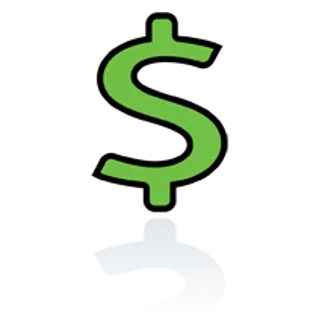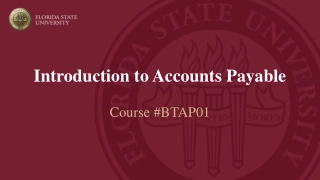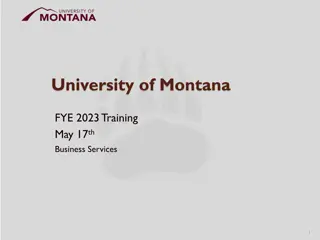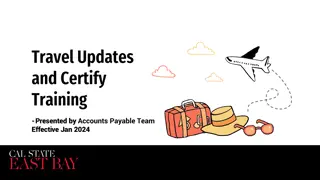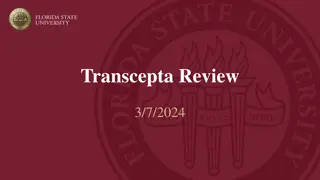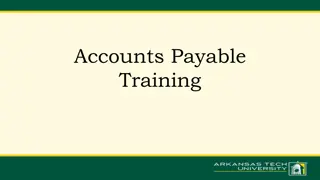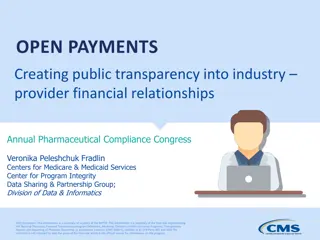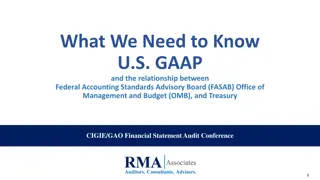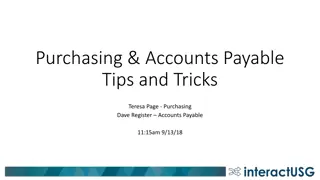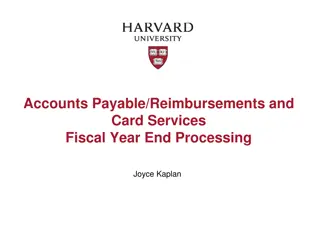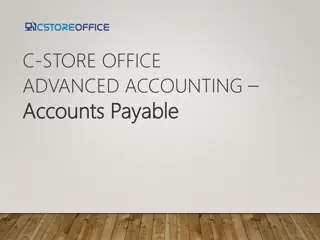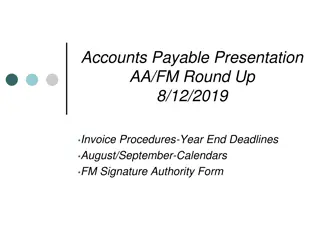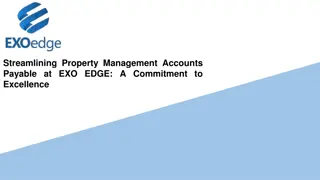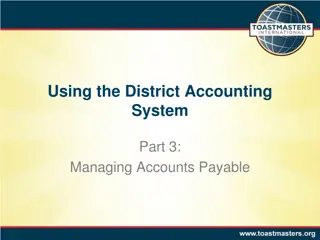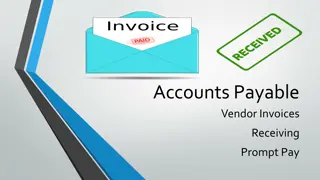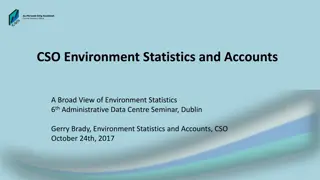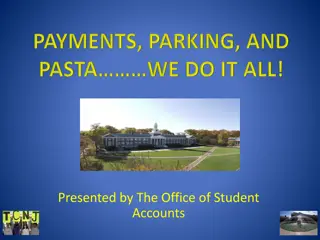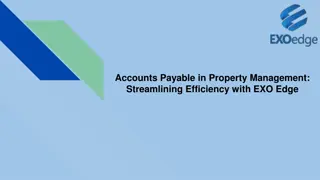Managing Accounts Payable and Business Payments Process
Exploring the detailed process flow of Accounts Payable and Business Payments, from creating BPAs to approvals and payment processing. Understand the roles of different departments and individuals involved in ensuring policy compliance and efficient payment disbursement.
Download Presentation

Please find below an Image/Link to download the presentation.
The content on the website is provided AS IS for your information and personal use only. It may not be sold, licensed, or shared on other websites without obtaining consent from the author. Download presentation by click this link. If you encounter any issues during the download, it is possible that the publisher has removed the file from their server.
E N D
Presentation Transcript
Accounts Payable FD-201 November 5, 2019
Agenda BPA s (Banner Payment Authorization) Travel and Travel Advances Enterprise Car Rentals Vendor and payment information Wire Transfers Purchasing Card Foreign Payments
The Life and Travels of a BPA BPA is created by a department and sent to University Business Services UBS routes the BPA: If contract/PO, wire or special check with certain account codes, routed to Procurement and possibly to Property Management (capital) Foreign payments are routed to Drew Keegan in HR Compliance Once other departments have approved, the BPA returns to Accounts Payable Accounts Payable team audits the BPA for policy compliance, checks rates for mileage, meal per diem, etc. Calls are made for missing forms (travel, hospitality, W9, etc) Calls are made for clarification, if needed BPA is routed to management and/or compliance team for review if the payment is for services to an employee Appropriate coding is reviewed according to the expenses being paid
The Life and Travels of a BPA (Continued) BPA is entered into Banner by Accounts Payable staff BPA is reviewed by AP Team Lead, AP Specialist, AP Manager or Director and released from AP If the payment is not on a grant, a file is sent to the State and a check is subsequently created or ACH is deposited. If the payment IS on a grant, the BPA goes into an approval queue to OSP for review. Once OSP approves the BPA, the file is sent to the State for payment
Department to Department or Department to State Agency Payments Create BPA as usual and send to Accounts Payable Department to Department payments are reviewed and processed by Tanya Arrington and Andrea Gullickson in Accounting Payments to other State of MT agencies are reviewed and processed by Tom Zulauf
BPAs - Getting Started Approved systems for generating BPAs are: APEX Benefits vendor info interfaces with Banner Catbooks/Agbooks Benefits comprehensive system, does more than just BPAs Handwritten Excel To learn more about APEX contact Darcy or ubshelp@montana.edu To learn more about Catbooks contact catbooks@montana.edu
Putting a BPA together Like a book Two staples at top border Loose or small receipts, taped to 8.5 x11 sheet of paper Do not print on recycled paper (paper with print already on it) No two-sided printing Why? To help us from having to flip pages back and forth and around and around; to help with filing; to avoid confusion; to make document imaging and scanning easier.
What info should I include on my BPA? Your contact information Name, email, office phone number Vendor name and address make sure what prints on your BPA is accurate! Vendor address should match remit to address on invoice. CatBooks users - make sure you re checking and updating CatBooks vendor information. APEX users if the address is incorrect, please contact UBS to verify the most current address is in Banner. If the payment (check) is being sent to an MSU department, include the PO Box. Room and buildings are not recognized as mailing addresses by the Post Office and may delay delivery. Payments between departments should be submitted on BPA to the receiving department, but will be processed via journal entry in the accounting office. Remit Info this is for the vendor & prints on the check stub/remit summary: Department Name Account number from the vendor Invoice number, Invoice Date, Invoice Amount Additional Info this is for you or for notes to the business office: DPO number, contracted services detail, other information that is important to the department s records, but not necessarily the vendor Tell us what you are paying for or a description of the expense being paid Authorized Signature we can t pay from an unsigned BPA
What info should I include with my BPA? Appropriate Forms: Travel Forms Travel Authorization Form, Travel Expense Voucher, proof of travel Procurement Forms Sole Source, Department PO, Contracted Services Agreement Hospitality Approval Form Food and beverage purchases, list of attendees, itemized receipts required Alcohol Approval Form Must be approved in advance for any alcohol purchases W-9 Form required for all payments (if recent one is not on file in AP) Form is available on the IRS website at: https://www.irs.gov/pub/irs-pdf/fw9.pdf (Rev. October 2018) Wire Form Include if payment needs to be sent via wire transfer Receipts! Reimbursements require original, itemized receipts no copies
What helps UBS in processing a BPA? 1. Include contact name and extension so we can reach the appropriate person if we have questions. Include the GID or Vendor Code for whom you are paying. There are many common names and unique combinations and we often have trouble determining which person to pay. i.e. John Smith, Jeff Johnson or nicknames such as Michael Gold when the actual name of the person is Christopher Michael Gold Check remittance address on invoice to make sure you are requesting the correct remit address, not necessarily what s in Catbooks or APEX. Make sure you are using current rates for mileage and meal per diem! If you are processing travel from different fiscal years, you may need to use two different rates. Explanation of the business purpose for the expense. 2. 3. 4. 5.
What helps UBS in processing a BPA? Appropriate Information: Attach the original invoice and/or itemized receipts we cannot pay from work orders, statements, quotes, credit card receipts, etc. Attach Google Maps or Mapquest lookup of mileage as support for miles driven when longer distances are involved Document the business purpose and list attendees for all hospitality Document variances between invoice and BPA total so we can include in memo Explain unique situations on separate piece of paper to expedite processing If the BPA is to pay an employee for something other than travel or reimbursement, discuss with Darcy X6411 beforehand to determine if it should be run through payroll or not. Payments to current employees for services other than their normal duties may cause a red flag with the IRS. Information is key include any information that may assist us in understanding what you are paying for or details of the situation (avoids phone calls and emails).
Payments to Employees Paying employees for services, participant support, awards, etc. The IRS red-flags taxpayers receiving both a W-2 and 1099 from the same place (MSU) Most payments to employees, other than reimbursements, must be processed through Payroll Dept submits through payroll - AP cannot forward the BPA to Payroll for processing Note that Payroll will alter your expense account code to a payroll expense account code (61127, 61124, etc.) Tax and benefit expenses for payments processed through Payroll will follow normal payroll logic Work with Darcy ahead of time to determine what payment method is appropriate. Provide as many details as possible.
Notes for Travelers If a new employee is going to be traveling, they should request a P-card Meals do not go on a P-card when traveling, per diem is given Meals provided by a conference cannot be claimed as per diem. A copy of the registration receipt, showing meals provided by conference should be furnished to UBS Hotel, airfare, registrations, shuttles should all be charged to P- card Keep all original, itemized receipts that are going to be claimed Keep boarding passes when applicable. Proof of travel is required! Please use MSU s contract with Enterprise Rent-a-Car for all vehicle travel
Prior to Travel A Travel Authorization/Advance Request should be completed PRIOR to travel if: All or part of the trip will take place outside of Montana The traveler is requesting an advance (generally only for meal per diem as other expenses should be on purchasing card) must be received in UBS office 10 business days prior to travel (additional week if new vendor) If lodging rates requested are above the standard rate, or the GSA high cost city rate http://www.gsa.gov/portal/category/100120 Foreign Travel: If traveling to a foreign country, please contact AP for foreign travel training as there are many rates and requirements related to foreign travel that are not included in this training. Personal Travel: If traveler is combining a trip with personal travel, a comparison ticket must be printed and attached! MSU will only pay up to the business portion of the travel. This includes parking, hotel, rental car, etc.
Travel Authorization form instructions 1. Check if Faculty/Staff or Student in the upper right-hand corner 2. Fill in Name, Campus, and Banner-Generated ID# (GID) 3. List your Address If a travel advance check is to be delivered to your department, you may leave the address information blank. If a check is not to be delivered to your department, list your home address here. This is also applicable if you have signed up for direct deposit for your travel reimbursements 4. List your department and a contact person knowledgeable about your trip, should there be questions about your travel. 5. Note the index/account to be charged for these expenses, or if paid by an external party, list that party 6. Describe destination and purpose of travel, dates of travel and any other important details. 7. List Departure Date/Time, Return Date/Time 8. Check the following reminder boxes Yes or No: Leave is approved/Classes Covered If you are combining this business trip with a personal trip. Note: extending the number of days you will be gone constitutes a Yes answer. Must attach comparison ticket and list the dates of business vs personal travel. MSU will only pay for the portion of the trip that is business related including hotel, parking, meals etc.
Travel Authorization form instructions (continued) 8. Check the following reminder boxes Yes or No (con t): Affirm that this travel is for business and within your budget, and is appropriate for an award (if necessary) 9. Check box for mode of transportation 10.For foreign travel, answer questions in shaded box. Complete additional forms as required (email confirming trip registered with OIP) 11.Fill in the Total Estimated Expenses 12.If requesting an advance, fill in the Travel Advance Request section A few things to note: UBS does not require a copy of the Travel Authorization form until AFTER travel is complete, UNLESS an advance is being requested. However, if using grant funds, the Travel Authorization form must be sent to OSP prior to travel, even if an advance is not requested.
After Travel Itemized, original receipts must be turned in to departmental accountant or person preparing payment paperwork A Travel Expense Voucher must be turned in after all travel when: Expenses are being claimed, including per diem A travel advance was given A BPA must be submitted when the traveler is owed a reimbursement for expenses or per diem. All itemized, original receipts must be attached. Credit card receipts are not accepted. If traveling by airline, note that that travel is considered out-of-state from the time of boarding. When using other modes of transportation, the geographical location will determine in- and out-of-state rates. Please make sure all forms are properly signed by traveler and authorized signer/department head Explain any unique situations if applicable
Clearing Travel Advances If a traveler received a travel advance and is owed for additional expenses: Submit a BPA and attach a copy of the Travel Authorization (TA), a Travel Expense Voucher (TEV), all receipts, and proof of travel if out of state Subtract the amount of advance from the total to be paid If no additional expenses are owed to traveler: Submit a TEV with proof of travel, all receipts, and a copy of the TA If the traveler does not use the entire amount of the advance, deposit the remaining funds with the cashiers and attach a copy of the PROCESSED deposit slip with the TEV Clearly mark that this is paperwork to clear a travel advance
Questions on Travel? Please contact an Accounts Payable associate or OSP staff/FM for assistance any time!
Enterprise Car Rentals Book online using MSU s Enterprise Booking Tool at: https://legacy.enterprise.com/car_rental/deeplinkmap.do?bid=028&r efId=GRP63MSU Benefits: Low Competitive Pricing Collision Damage Waiver & $1M Liability included Unlimited Mileage No Fee for Drivers Under 25 18+ allowed to drive under this contract No Fee for Additional Drivers Discounted pricing for rentals over 30 days Note: Rentals over 30 days or out of the US should contact Brenda with Safety & Risk in order to extend the state coverage (x6888) Rates extend to Student Organizations/Affiliations Optional delivery to motor pool
Payment Options MSU Purchasing Card Preferred method of payment Name on purchasing card should match name of driver or use alternative payment option MSU Departmental Billing Number Allows those without purchasing cards to rent Tied to an MSU purchasing card One per department, contact your departmental accountant to see if you have one set up Billing number must be provided at time of reservation (8-digit number) Contact Darcy Tickner to request a new billing number Direct Bill to Index Number Allows those without purchasing cards to rent For individuals/departments with very minimal needs Index number & department name required at time of reservation
Tips for booking with Enterprise If the booking website shows no cars available: Contact Eric Berg at 406-548-4476 or Erin Kramarich at 406-896-0752 to check availability Limited number of cars may be held back for MSU Can also rent from National Car Rental with our contract number (contact Eric or Erin) Book Early! We share the cars with tourists, local events and MSU events Book cars early in semester when you know you will need them (student trips, etc) Large SUV s are limited, can get more from other branches if available, but not within a day Remember to cancel if you don t use the car or you will be charged for at least one day of the rental
Checking Vendor Information Vendor Maintenance Form FTMVEND Use this Banner form to: Find vendor code Confirm W9 is on file so vendor can be paid Determine if vendor is set up to receive ACH payments Verify correct vendor payment address
How do I find a vendor code? Vendor Codes: In most cases, the naming convention for vendor codes is the first three letters of the first name plus the first three letters of the second name. Ex: (Reporters Office Plus = REPOFF). To query/search for a vendor code in FTMVEND: 1. Click on the drop down ( ) to the right of the Vendor box. 2. Enter your query in the Last Name field. 4. Use the wildcard search character % to maximize your search results. 5. Press Go, then select the correct vendor, then Go to execute the query.
How can I see if a W9 is on file? In FTMVEND, go to the Additional Information tab look for ******* in the SSN/SIN/TIN area Go to RELATED Text [FAOTEXT] to see when W9 was requested/received If it was received over 2 years ago or there is no information, please get a new completed W9 from the vendor before payment can be made. All address changes require a new W9 on file
Is this vendor set up on ACH? In FTMVEND, go to the Address tab Arrow down through the addresses VE vendor address type indicates that the vendor is set up to receive ACH payments (make sure Inactivate Address is not checked) The corresponding sequence VP address is the address to put on your BPA, even if the vendor is set up for ACH
Is this vendor set up on ACH? VP Address sequence should match VE Address sequence for ACH vendors
ACH FORM (DIRECT DEPOSIT) Required for all new setups and changes to ACH Information Contact Accounts Payable to obtain a form Not online due to fraudulent activity
Has my payment been processed? Vendor Detail History Form FAIVNDH Search for vendor following steps in previous slide This leads you to the vendor history screen where you can choose from all invoices, credit memos, open invoices or paid invoices. The check number listed at the far right is not the check number the vendor receives. The Department of Administration in Helena prints our vendor checks for us and assigns their own check numbers. Contact UBS for information on vendor checks. You can further drill-down on a particular invoice by highlighting the appropriate line and clicking RELATED on the menu bar and the View Invoice Information [FAIINVE] link.
Outgoing Wire Transfers Foreign and Domestic Wire Transfers Wire Transfer form (use for all wires): http://www.montana.edu/ubs/documents/OutgoingForeign WireTransfer.pdf Attach this form to all BPA paperwork and supporting docs List currency as it is listed on invoice. If invoice is in Euros, BPA should have Euro amount, please mark currency clearly Special instructions should include: remit info for vendor, account number, invoice number to help vendor apply payment correctly If wiring US Dollars, please include separate line on BPA with index and account 62802 for $20 processing fee
Incoming Wire Transfers Contact Andrea Gullickson for information 994-5727 or andreag@montana.edu
MSU Purchasing Cards P-card application form Please remember to complete ALL fields on the form and DO NOT modify https://www.montana.edu/ubs/purchasingcard/index.html Information Needed: Full Legal Name (now required) Entire GID number Entire PO Box address Phone number with area code (for US Bank to contact in case of fraud) Org number Can accept completed DocuSign pcard applications, please only include last four digits of GID.
Receiving the pcard New cardholders will be required to complete an online quiz Cardholders may take quiz at time of application UBS will mail new cards to PO Box listed on cardholder statement after cardholder has completed the quiz UBS will mail replacement cards to PO Box listed on cardholder statement Card Expiration Dates If card expires Nov 2019, it is valid through Nov 30, 2019
Suspected Fraud on pcard Cardholder (not departmental accountant) must call US Bank directly to verify charges Security questions cardholder needs to know PO Box on pcard statement Phone number associated with card Single purchase limit Last 4 digits of GID (in place of SSN) Merchant Compromise
Pcards things to remember Limit increase requests Single limits Over $5,000 non-travel related-must be approved by Procurement. DO NOT SPLIT PURCHASES. Cycle limits Monthly cycle dates-refer to UBS Pcard website Index and Account code change requests Must clearly provide information Pcard Account Manager & Business Manager Changes Must provide ALL ORGs you are requesting access to
Pcards things to remember Review all your indexes for activity in 62886 process corrections promptly Fraudulent charges leave in 62886, credit will post here Add consistent, meaningful descriptions Example: NACUBO-M Smith Dallas TX Sept 2014 For out of state/country travel traveler should notify US Bank Travel justifications Include one copy behind report page for each traveler/trip, we don t need a copy with each receipt.
Foreign Payments - Reviewed by Drew Keegan HR Compliance - Taxability - Applies to all foreign payments individuals or businesses
A Foreign National is a person who is neither a citizen of the United States nor a permanent resident alien. For immigration purposes, a Foreign National is a person who is not a citizen or permanent resident of the United States who has been admitted on a visa for a temporary stay that will end when the purpose of that stay has been fulfilled. For tax purposes, a Foreign National is generally a F-1 full-time student who has been in the US for less than five calendar years or a J-1 teacher/researcher who has been in the US for two calendar years or less out of the last six calendar years. Because resident and nonresident aliens are taxed differently, it is important that Foreign Nationals know their tax status. A nonresident alien is neither a US citizen nor a resident alien for tax purposes. A resident alien for tax purposes satisfies either the green card test or substantial presence test for the calendar year. One is considered to have satisfied the green card test, and is therefore a resident alien, if at any time during the calendar year was a lawful permanent resident of the United States according to immigration law and this status has not been revoked or administratively or judicially determined to have been abandoned. One satisfies the substantial presence test, and is therefore treated as a resident alien for the calendar year, if they have been physically present in the United States for at least: immediately preceding the current year. To satisfy the 183-day requirement, count: All day present in the current year One-third of all days present in the first year before the current year, and One-sixth of all days present in the second year before the current year. 31 days during the current year, and 183 days during the 3-year period that included the current year and the 2 years
Tax Forms for Foreign Payees Under United States law, foreign individuals and entities are subject to withholding on US Source Fixed or Determinable Annual or Periodic (FDAP) Income. Montana State University, as a withholding agent is required to withhold unless a foreign payee can demonstrate that income is not US Source FDAP income or a tax treaty exemption is available for such income. Non-withholding is substantiated through the provision of certain United States Tax Forms. Claim of Tax Treaty Benefits Foreign vendors, students, and scholars may be eligible to claim the benefit of a tax treaty if one exists between their country of residence and the United States. The first step in determining eligibility for the benefits of a tax treaty is to determine whether the US has entered into a tax treaty with the individual or entity's country of residence. The second step is to determine whether the individual or entity meets the requirements of the Article of the treaty under which the benefit is claimed. A full list of current tax treaties entered into by the US can be found at https://www.irs.gov/businesses/international-businesses/united-states-income-tax- treaties-a-to-z. This list can be used to determine if there is a tax treaty between the US and the relevant country and, if so, whether the individual or entity meets the requirements to claim the benefit of any Article of the tax treaty. The IRS has also provided several summaries of https://www.irs.gov/individuals/international-taxpayers/tax-treaty-tables. Individuals and entities may also wish to consult Publication 901 (US Tax Treaties) for additional information. available tax treaty benefits at



